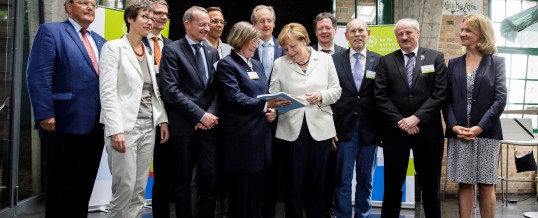
Die Digitalisierung transformiert unsere Gesellschaft grundlegend, gestaltet zentrale Bereiche des Lebens neu und fordert die Demokratie heraus. Nicht die Frage, ob, sondern wie digitalisiert wird, ist von zunehmender Bedeutung. Die Agenda 2030 mit ihren 17 Zielen gibt die Richtung bereits vor. Der Nachhaltigkeitsrat empfiehlt der Bundesregierung Digitalisierung konsequent darauf auszurichten, emanzipatorische Potenziale, Zugang zu Informationen, dezentrale Teilhabe, offene Innovationen und zivilgesellschaftliches Engagement in demokratischen Strukturen zu fördern.
Aus Sicht des Nachhaltigkeitsrates erfordert dies eine breite, partizipative und durch empirische Forschung und praxisnahe Formate gestützte Debatte über die Auswirkungen der technologischen Entwicklungen, die zu einem Wandel in Gesellschaft, Wissenschaft, Politik und Wirtschaft führt.
Eine umfassende Orientierung der Digitalpolitik an der Deutschen Nachhaltigkeitsstrategie sowie deren Ziele und Managementregeln begünstigen eine Stärkung der freiheitlich-demokratischen Grundsätze. Eine systematische Veränderung der Rahmenbedingungen für Digitalisierung fördert die Schwungrad-Kraft von Digitallösungen, stärkt sie als Ermöglicher der Energiewende, sorgt für mehr Ressourceneffizienz und „grüne Technologien“ und erhöht ihren Nutzen über den Rahmen der Digitalstrategie hinaus. Die Bundesregierung sollte die EU-Ratspräsidentschaft Deutschlands 2020 nutzen, um eine europäische Strategie einer nachhaltigen Digitalpolitik zu entwickeln. Eine Verknüpfung der digitalen Agenda Europas mit der Agenda 2030 für nachhaltige Entwicklung kann das Erreichen der Sustainable Development Goals (SDGs) in den dann verbleibenden 10 Jahren wirksam unterstützen.
Weiterhin empfiehlt der Nachhaltigkeitsrat ein bildungspolitisches Vorsorge-Prinzip, das Menschen von der Kindheit bis ins hohe Alter befähigt, umfassend an der digitalen Gesellschaft teilzuhaben und Bildungsangebote zum Erwerb digitaler Kompetenzen und die einer Bildung für nachhaltige Entwicklung fördert.
Weitere Empfehlungen für eine nachhaltige Digitalisierung widmen sich den Bereichen Arbeitsmarkt und soziale Sicherung, Gesundheit und Mobilität.
sustainable_AND_digital Sustainable development as the framework for digital transformation
Recommendation of the German Council for Sustainable Development (RNE) to the German federal government
Sustainability strategy: Digitalisation has the potential to engender disruptive developments in the business world as well as society as a whole that carry both great opportunities and significant risks. The digital transformation therefore also translates to new challenges for societal cohesion, democracy and inclusive culture. At the same time, however, it can play an important and supportive role in achieving the far-reaching goals of the German Sustainable Development Strategy. We therefore recommend that the principle of sustainable development serve as the political framework for digital transformation (recommendation 1).
Innovation and research: There are no precise predictions as to what impact digital transformation will have on natural resources, sustainable business practice or the future of work. Sustainable development research and innovation policy therefore have important roles to play in order to evaluate impact, facilitate change and foster knowledge transfer by creating links to societal reality. We therefore recommend that there be practical research formats that facilitate trialling as well as long-term systematic research into digitalisation in relation to the sustainability goals (recommendation 2).
Exploiting enabler powers: The opportunities to use digitalisation to achieve the sustainability strategy goals, to position them as the enablers of sustainable development and to avoid risks and disadvantages remain largely untapped. We recommend that the federal government systematically change the underlying conditions in order to make far greater use of the enabler powers of digital solutions above and beyond the framework of the digital strategy, in particular regarding the energy transition, resource efficiency and “green technologies” (recommendation 3).
Education to safeguard the future: Digital education is the foundation of sustainable societal development in the area of digitalisation and for safeguarding the labour market. We recommend that the federal government follow a precautionary principle regarding education policy. This should enable people of all ages, from childhood to old age, to comprehensively participate in digital society. It must do its part to close the digital divide (recommendation 4).
2
Vision of Europe: We recommend that the federal government establish a vision of Europe as a sustainable living and economic area in partnership with other member states (recommendation 5). The federal government should, in particular, use Germany’s 2020 Presidency of the Council of the European Union to this end.
The following opinion examines the key recommendations in greater detail.
